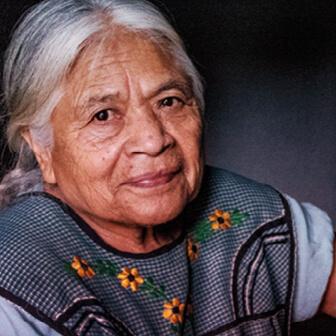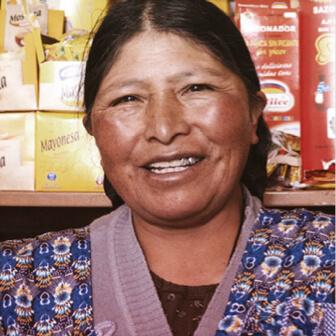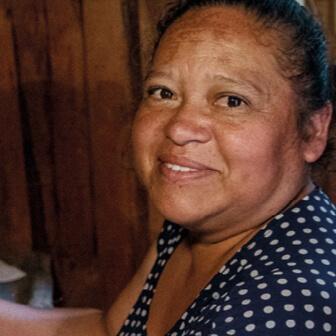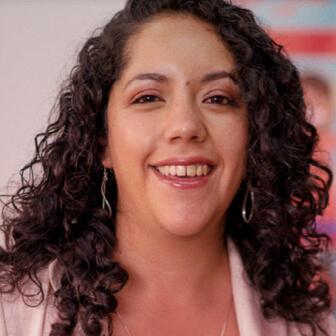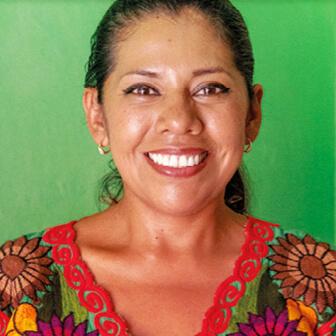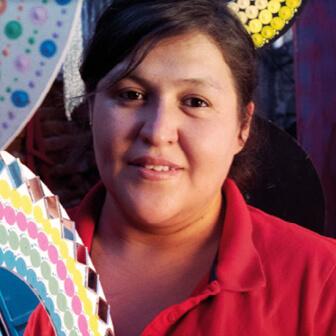Pro Mujer in Nicaragua Hosts Inaugural Velasco & Patterson Society “Encuentro”
26 marzo, 2012
Blog, Events, Partners, The Women of Pro Mujer, Voices from the Field, Volunteer & Donor Stories
By Josh Cramer-Montes, Director of Communications
EN·CUEN·TRO [En-KWEN-tro]
From the verb encontrar
1. m. (reunión) a meeting, encounter: un encuentro entre amigos / a meeting among friends
On March 5th and 6th, key Pro Mujer supporters from around the world came together to participate in an inaugural trip for the Velasco & Patterson Society’s (VPS) in-country Encuentro series. Named after Pro Mujer’s Co-Founders Lynne Patterson and Carmen Velasco, VPS is a diverse group of philanthropic leaders dedicated to raising awareness of and financial support forPro Mujer’s work, enabling impoverished Latin American women to break the cycle of poverty.

Pro Mujer staff, clients, VPS members and supporters.
VPS’ Encuentros are a series of in-country meetings where key supporters are able to visit our operations, interact with staff and clients, and see how their donations are being invested. Our donors truly are investors;numerous studies have shown that women reinvest 90% of their income in their households. In this way, empowering women creates a multiplier effect.
The daughter of a Pro Mujer client comes to a communal bank meeting with her mother.
Joining us on this trip were longtime Pro Mujer supporters, including: Stanley Eisenberg and his partner Mary Jones; Renate Rennie, Chairman and President of the Tinker Foundation; Gail Bradley, representing John and Jacque Weberg of The Weberg Trust; Mark McMahon and his partner Roberto Moreira; Claudia Valle, General Counsel and Compliance Officer for Citi Nicaragua; and her colleague Enrique Gasteazoro Elizondo from Citi’s Public Affairs and Corporate Social Responsibility division.
Nicaragua was the first country outside of Bolivia (where Pro Mujer was founded in 1990) that Lynne Patterson and Carmen Velasco selected to advance their mission of helping empower Latin American women living in poverty. They founded Pro Mujer in Nicaragua (PMN) 15 years ago, and since then, the organization has disbursed more than US$122 million dollars through 487,000 small loans to Nicaraguan women entrepreneurs, who borrowed an average of $250. Over the course of two decades, PMN has provided Nicaraguan women with 64,460 educational workshops covering a variety of subjects including communications skills, sexual and reproductive health and domestic violence, and has performed 77,767 health consultations.
Pro Mujer nurse Maria Teresa Centeno
While PMN has done a great deal to advance the wellbeing of economically marginalized women and their families, there are many more women who still need to be reached. Nicaragua is the second poorest country in the Western Hemisphere after Haiti; 48% of its 5.7 million inhabitants live below the poverty line, and a staggering 80% subsist on less than $2 per day.
As in many other developing countries, women comprise the majority of Nicaragua’s economically marginalized population. Of the 70% of the population that works in the informal sector – which includes jobs such as selling fruits and vegetables on the side of the road, running a convenience store out of a home – 75% are women. A relatively high proportion of Nicaragua’s homes have a woman as head of household: 39% of urban homes and 28% of rural homes.
A Pro Mujer client.
Despite the many hardships facing its people, there is something almost mystical about the country, a feeling I had the first time I traveled there and one rekindled during this visit. Perhaps it’s the vibrant and persevering spirit of Nicaraguans in the face of those challenges,as well as the rich culture, warm climate and beautiful landscape.
The first day of our trip begins with inspirational welcome remarks by PMN Country Director, Gloria Ruiz. Although she is just over 5’0 tall, Gloria hasa large presence and is a leader in the truest sense of the word. She faced poverty and gender discrimination as a child, and eventually earned a degree as an Agricultural Engineer, a male-dominated profession in her country. Gloria is a mother to three grown children, a grandmother to a new grandson, and has been married for 28 years. She joined Pro Mujer 15 years ago as its first credit officer and todayshe is Country Director. Gloria is truly an inspirational force with whom to be reckoned; you can read more about her inspirational journey in this International Women’s Day profile piece from Nicaragua’s El Nuevo Diario.
A communal bank leader in León counts her group’s loan repayments.
Following Gloria’s presentation, we head over to our Leon center. Dr. Gabriela Salvador, MD, MPH, our Director of Health and Human Development who oversees our global health program, gives the group a presentation on our health pilot program and explains how Pro Mujer is addressing the increasingly serious issue of chronic disease. These diseases include hypertension, diabetes, sexual and reproductive health problems, and breast and cervical cancers, and are pandemic within the segment of the population we serve.
Dr. Marta Garcia in one of the consultation rooms of the Pro Mujer clinic.
Afterwards, we move next door to the new wing of the center, a beautiful, colonial-style building with a lush garden in the center, 20-foot ceilings and beautiful wood paneling and detail throughout.
The new wing (behind the three large wooden doors and the two garage doors to the left) of the Leon center made possible by Pro Mujer supporters.
Here we meet with local team members to learn their personal stories, how they came to work for Pro Mujer and how the lives of their clients, as well as their own, have changed. Their stories are both funny and moving, but one speaker really stands out. Elsa Soza is an Expansion Specialist who has been with Pro Mujer for eight years. She relates the story of how she was born into poverty and abuse. As an adult, that abuse changed hands and continued until she was finally able to break the cycle a little over a year ago. You can read her first-person account as told to the group by clicking here.
Gloria Ruiz leads the discussion between Pro Mujer supporters and international staff members (left) and local employees (right).
Eight client leaders then shared their personal testimonies, telling us about the challenges they faced when they first came to Pro Mujer and how much their lives have changed since.
Communal bank leaders share their stories of challenges and triumph.
All of these women were born into poverty. Many had limited access to education, were victims of domestic violence and were raising their children alone. Despite these obstacles and as a result of their hard work and perseverance, their children are attending university and becoming doctors, lawyers and engineers. This new generation, the one they helped raise and educate, will be the generation that helps rebuild Nicaragua.
As Mark pointed out, “It was funny to note that several of the women never even talked about what they use the loan money for, but what it (Pro Mujer) has brought them.” It was everything else that they received – the safety and supportive environments of their communal banks and the interactions they shared with their fellow members, workshops in business development, communications skills and women’s rights, and the recurring theme that they are a worthy investment – that was really important to them.
Some of the things clients said were truly powerful:
“They didn’t give me money; they gave me ideas, strategies to help myself.”
“Thanks for showing us that we can help ourselves.”
The evening closed with a traditional Baho, a dinner of typical Nicaraguan food including beef, plantains and yucca wrapped in banana leaves and steamed. Traditional music played in the background and we sat down to share a meal with the client leaders and staff.
On the morning of Day 2, we found ourselves shadowing one of our mobile credit officers, Rosa María Ramirez. Rosa is about 25 years old and beams with positive energy. She spends her day crisscrossing the rough, rural roads around Leon on a dirt bike in order to attend to her clients.
Rosa María Ramirez begins her day.
Pro Mujer credit officers traverse rough roads day in and day out. Now imagine it during the rainy season.
Some of the areas where these credit officers go are isolated and dangerous and they try their best not to stand out, which is why they don’t wear anything that says Pro Mujer. Even though they don’t carry money, bandits often think they do. To ensure their safety, credit officers call in or send a text message every time they depart from and arrive at a communal bank meeting.
Our first visit of the day is to a communal bank called Divina Pastora. The group consists of approximately 20 women who are in their 25th loan cycle, which means that they have been with Pro Mujer for approximately 12 years. They are particularly proud of the fact that they have been with Pro Mujer for so long, as they are among the pioneering women of microfinance in Nicaragua. It is a particularly special day for them as Lynne and Carmen will be sitting in on their meeting.
It’s always heartwarming to see how our client’s faces light up when they actually meet Lynne and Carmen. For many of our clients, they are like mythical figures that they’ve only heard about in stories. When we arrive, we are greeted with a red and white tape that Lynne and Carmen are to cut. Carmen makes a joke and tells the group, “I bet you didn’t think we were real!”
Carmen and Lynne cut the ceremonial ribbon for the beginning of the Divina Pastora’s meeting.
VPS member Mary Jones bonds with a client.
After the meeting we have a chance to ask the women questions and learn more about their experiences. At the end of our time with them, the women of Divina Pastora share homemade candies with us and send us on our way with sandwiches and something to drink for the journey ahead.
From L to R, VPS member Stanley Eisenberg; Lynne Patterson; Jason Wu, Director of Development, Individual Giving and the person who oversees the Velasco & Patterson Society; Carmen Velasco; and Stanley’s partner, Mary Jones.
Our last visit is to a client named María Concepción Moran. I first heard María Concepción’s story last June, when my colleague Yolanda Bravo sent me a blog post of an interview she did with her. The post, which you can read here, is a first-person account as to how her life changed as a result of a housing loan she received from Pro Mujer. I remember the before and after pictures and I knew her story well, but I must admit that sitting in her backyard and listening to her tell her story in person is far more powerful.
María Concepción in the convenience store she runs out of her home.
Neighborhood children stand outside of her store.
Like so many women we spoke to on this trip, she talks of the hardships of growing up poor. As an adult, she and her husband lived in homes made of plastic and cardboard boxes that she and her children would pick out of the trash to use for walls and a roof.
What María Concepción’s home used to look like.
For years they lived in miserable conditions. The slightest drop of rain would come straight through the roof. When the torrential rainstorms of Nicaragua’s wet season would arrive, the cardboard roof would often collapse and the dirt floors of their home would turn into rivers of mud. Things only got worse when her husband was laid off from work and their only source of income was what she made from ironing clothes.
A friend told her about Pro Mujer. After attending an informational session in 2010, she took out her first loan of $133. She used the proceeds from the loan to buy goods to open a small store in the front of her house. Since then she has expanded her store and put up concrete walls.
Today, María Concepción’s life – and that of her family – is brighter. When asked how she has changed, she responds, “I have more confidence and now my husband respects my decisions.” She used to be afraid of the rain but this year she chuckles and says that she’s looking forward to the rainy season so she can laugh at it under her new roof. “For my family and me it was one of the happiest moments…to know that we were not going to get wet anymore when it rains.”
Then, María Concepción throws us all a curve ball. Just when things seem to be going so well for her, she tells how us how a Pap smear performed at one of our health clinic came back positive for pre-malignant uterine cancer. Fortunately it was detected early and the prognosis seems relatively good. In fact, she was going in for surgery the following week.
From L to R, Gloria Ruiz, María Concepción’s son, Lynne Patterson, María’s husband and daughter, María Concepción and Carmen Velasco stand in front of the family’s brick walls.
Just before we leave, María Concepción’s daughter (center) asks for a group picture to remember the visit.
It was an emotional visit but one that left us all feeling very happy. It was incredible to see how with the right opportunities, one client’s life can change completely.
The VPS’ first Encuentro left us all hopeful for the future. We were able to learn from one another and it was a true testament to what we can accomplish together. As the American cultural anthropologist Margaret Mead once said, “Never doubt that a small group of thoughtful, committed, citizens can change the world. Indeed it is the only thing that ever has.”
Stay tuned for more information about the next Encuentro. For more information about the Velasco & Patterson Society or to learn how you can get involved, please contact Jason Wu at 646-626-7000, x108 or via email at jwu@promujer.org
All Photos Courtesy of Pro Mujer.
